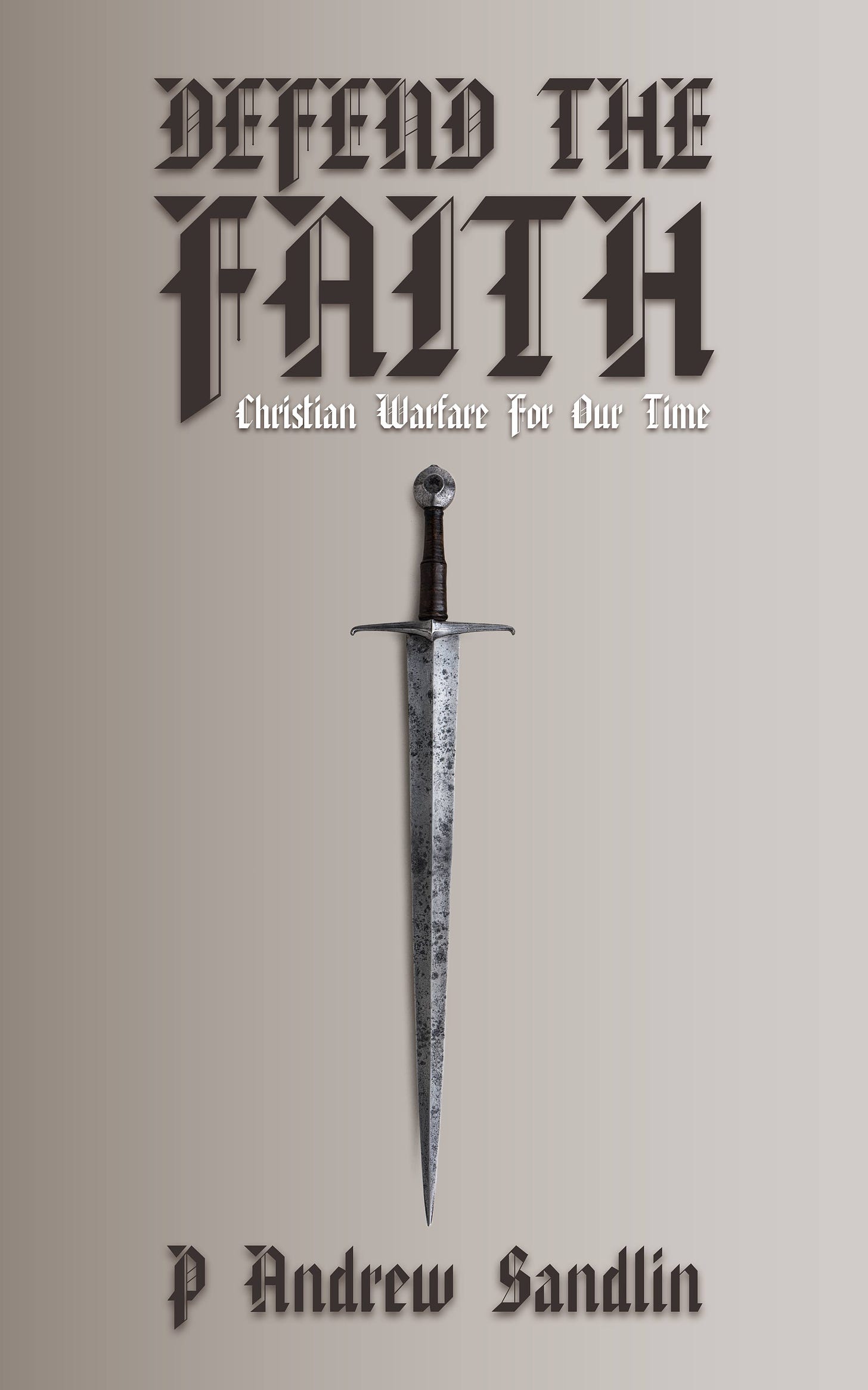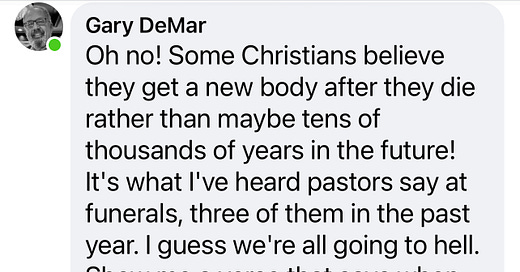
Christendom Is Not the Problem: A Response to David French
A robust, red-blooded, widely held Christianity without Christendom is a self-contradiction. The right kind of Christianity inevitably produces Christendom.
Dear friends and supporters:
Since for two decades I’ve lead a Christian think tank devoted to fostering Christendom, David French’s frontal assault on American Christendom caught my eye. David has been an influential conservative thinker for years, and his contribution on many issues has been a great benefit. His essay a few years ago on “Malign Marcuse” accurately unmasked the culturally Marxist impulse behind much of the Leftist ferment on today’s university campuses.
More recently, David persistently situates Donald Trump in his crosshairs (I’m not a member of the Trump fan club), but now he is is suggesting that the American version of Christendom has colluded with Trump to undermine authentic Christianity. He enlists the 19th century father of existentialism Søren Kierkegaard to support his thesis that, in the end, Christianity and Christendom are incompatible.
Kierkegaard’s chief philosophical contribution was his withering assault on system-builders, especially Hegel, whose thought highlighted the general, the universal, the objective, and the abstract. Kierkegaard countered with the specific, the individual, the subjective, and the concrete. SK, more than Kant, subjectivized Western philosophy.
SK’s theological contribution was his equally savage verdict on the establishment Christianity (“Christendom”) of 19th-century Denmark. The latter, according to SK, was formal, cold, hypocritical, and just plain un-Christian.
SK has been an intellectual hero for two kinds of thinkers: first, those who do “inside-out” philosophy, dismissing objective standards and embracing subjective choice; second: people who perceive culturally established Christianity as a menace cured by a radically devoted, heart-felt, surrendered, and often persecuted life. David describes this life:
Here is where the upside-down truths of the imitation of Christ become so difficult, including one of the most foundational, “If anyone would come after me, let him deny himself and take up his cross and follow me. For whoever would save his life will lose it, but whoever loses his life for my sake will find it.”
In other words, to live I must die. Yet our death, unlike Christ’s, isn’t innocent. We sin, we repent, we’re symbolically buried with Christ, and then we’re reborn by his power alone. Or, in the words of Paul in Galatians, “I have been crucified with Christ. It is no longer I who live, but Christ who lives in me.” Or, elsewhere, in Romans, “if we have been united with him in a death like his, we shall certainly be united with him in a resurrection like his.”
This is true Christianity, the religion that American Christendom subverts. What, then, is American Christendom, and how does it threaten Christianity?
Think of the distinctions roughly like this—Christianity is the faith, Christians are believers in the faith, and Christendom is the collective culture and institutions (universities, ministries) of the faith….
America doesn’t have a state-established church, but it certainly possesses a version of the Christendom Kierkegaard despised. America possesses immensely powerful, immensely wealthy Christian institutions that may not be part of the state but in many places are strong enough to exercise power over the state. And they certainly create their own culture, a culture that shapes the daily lives of millions of Americans.
The Cultural Inefficacy of Current U. S. Christian Institutions
But David gives Christian institutions far too much credit. Even if they shape the lives of as many as “millions of Americans,” that influence is barely felt culturally. That our society is indisputably in a radically secular free-fall is an empirically observable, undeniable fact. Our educational system is overwhelmingly secular and hostile to Christianity. Christian influence in major media is virtually non-existent. Hollywood is secularism (or, more recently, Neo-paganism) on steroids. Popular music reeks of unrestrained sex and radical autonomy. In recent years even big business has capitulated to “wokeness” and the Sexual Revolution.
When David writes that “immensely powerful, immensely wealthy Christian institutions that may not be part of the state … in many places are strong enough to exercise power over the state,” he seems to writing in the fog of unreality. Where is this vast Christian cultural power? Surely, not in the nearly 50-year political commitment to national abortion rights. Not in the legalization of same-sex “marriage.” Not in dramatic and draconian government wealth redistribution during the Covid drama. If Christian institutions are exercising power over the state, the effect has been radically anti-Christian legislation and consequent culture.
This is not to say that there has been no beneficial cultural impact by Christian institutions. Samaritan’s Purse has furnished millions of dollars of aid during natural disasters and other hardships, and the Alliance Defending Freedom has won case after case protecting religious liberty. Unfortunately, ministries like these have been the exception.
While, therefore, Christian institutions might still command the allegiance of “millions of Americans,” that allegiance does not demonstrably translate into anything approaching Christian culture. Influence over individuals is not tantamount to influence over cultural institutions; only culturally committed Christians can do that.
David’s analysis would have been much more correct had he been writing 200 years ago, when Christian culture in the United States was a reality, even if a faint one. It is flatly not correct in today’s climate.
(continued below)
The Christian life is a battle, and battles presuppose enemies. The chief enemy of Christians is Satan (and demonic spirits aligned with him [Eph. 6:12]), but a leading strategy in thwarting God’s earthly kingdom is his enlisting humans to assist him. This diabolical strategy started in Eden.
The Bible assumes that the true Faith will constantly be under attack in the sinful world and in the church. This doesn’t mean that we should invent enemies when there are none. There are enemies aplenty already.
Get the new e-book here.
Sidelining the Blessings of Christendom
(continued)
Next, David correctly indicts Christian institutions that employ their wealth and size to cover up and excuse sinful, destructive behavior:
As we’ve watched Christian abuse scandals unfold, we’ve seen Christendom enact the exact reverse of this [self-sacrificial Christian] message—for it to live, someone else may have to die. When a girl or a boy, a woman or a man, comes forward, fearful and trembling, with a story of abuse, it is simply remarkable how often American Christian institutions adopt, entirely, the godless playbook of secular corporate self-defense.
And in fact all too many American Christian institutions are corporations first. They’re perpetually-existing legal entities who confront each and every scandal with a single prime directive: This ministry must endure. It is too important to fail. It cannot die.
David invokes the late Ravi Zacharias as well as Kanakuk Kamps as prominent evangelicals whose ministries betrayed members and squashed attempts to hold the abusers accountable, but he could also have mentioned the countless sexual abuse scandals in Roman Catholicism and other groups and institutions across almost the entire Christian spectrum. There’s plenty of institutional abuse going around in our world — and by no means is most of it in Christian institutions.
Unfortunately, David does not acknowledge the hundreds of thousands of Christian institutions that do not cover up internal sin and that stand firmly for Jesus Christ and the Faith and biblical ethics. If institutional cover-up of sin invalidates American Christendom, it would seem only fair to admit that institutional fidelity to Christian ethics bolsters its case.
Of course, a single episode of abuse and cover-up is one too many, but discounting American Christendom (when defined as a web of Christian institutions) is a hasty verdict.
A more significant omission in his analysis, however, is his failure to recognize the salutary consequences of Christian culture, Christian institutions, and American Christendom. Western civilization is unthinkable apart from Christianity — not so much from intensely pious individual Christians, but from Christian institutions.
Alvin J. Schmidt’s Under the Influence: How Christianity Transformed Civilization and many other works document all the spheres of life that Christianity as a cultural force (and not merely an individualistic belief system) has forged in the West. In the dignity of human life, the exaltation of women, the purification of sexuality, the rise of modern science, the exaltation of labor and vocation, the creation of economic liberty, the spawning of political liberty, the abolition of slavery, and more, Christianity and its institutions — not merely aggressively devoted individual Christians — helped create the most salutary blessings of our world.
Had our forebears been convinced of David’s anti-Christendom and anti-institutional paradigm, these benefits would likely never have emerged. Only Christendom and institutional Christianity can create and foster Christian social structures from which David and all of us derive such boundless daily benefits and which often we sadly take for granted.
Doctrine-less Christianity?
An odd assertion appears several times in David’s piece. Here’s an example:
But Kierkegaard’s fear was that as Christendom waxes, Christianity wanes. The true imitation of Christ becomes not wisdom, but folly. Many people may choose doctrine. Few people choose the cross.
Several times, in fact, he contrasts doctrine with Christianity. This was a common practice of 19th and 20th century Protestant liberalism (“No creed but Christ”; “Doctrine divides; Christ unites”; “Just give me Jesus”).
This is an easily confuted, short-sighted notion. Christianity isn’t at root an ethical system like Islam. Its ethics are consequences of its redemptive events and their interpretation. This was part of the apostolic preaching (doctrine called the kerygma). It is at the heart of Christianity. In fact, without doctrine, there can be no Christianity.
David prefers the cross and diminishes doctrine. But the cross must be interpreted — it’s not a self-interpreting event: lots of ancients suffered crucifixion. Indeed, the apostle Paul’s writings are partly devoted just to this agenda — interpreting Jesus’ redemptive events. We call this doctrine.
This is just as true of other foundational elements of Christianity. The patristic (post-apostolic) church thought long and hard about how “God in three persons” was the “blessed trinity.” In addition, they were obliged to explain how Jesus Christ was both God and man. In addressing these and other theological issues, they developed orthodox Christianity, which all true Christians either affirm or assume.
One way or another, every Christian embraces doctrine. If we say we want not the cross but Jesus, we’ll need to consider who gets to define who Jesus was and is. There is no possibility of trusting and obeying Jesus if we don’t know the Jesus we’re trusting and obeying.
Harold O. J. Brown wrote: “For many religions, the cardinal test is right conduct or right observance; for Christianity it is right faith. Christianity is full of specific doctrines.” To marginalize doctrine is not, therefore, only to undermine Christendom.
It is to undermine any Christianity at all.
The Inevitability of Christendom
David suggests mercenary and other sub-Christian motives behind Christendom:
Anybody can believe in (or profess) a doctrine, even a countercultural doctrine. In fact, in the present age, there is a great deal of money and fame to be gained by directly and “courageously” attacking secular ideas like, say, critical race theory or so-called “cultural Marxism.”
You can stand strong for solid teaching and sound doctrine on Facebook, YouTube, and Twitter. You can boldly venture into hostile territory in the academy or Hollywood. You can build immense churches and ministries. You can form powerful political movements—all without compromising one inch on the orthodox theological truths of the Christian faith. In America at least, Christendom thrives. There is a market for what it sells.
These are temptations to which Christendom (and not only Christendom, but any idea-grounded institution) is vulnerable, but David seems not to grasp that the very form of intense Christianity he advocates will inevitably move toward Christendom as Christians implement their faith in spheres of their lives beyond their vertical relationship with God. In this situation, Christendom is inevitable.
The 20th century’s leading intellectual champion of Christian culture, Christoper Dawson, puts it this way:
[H]owever widely one separates the Word and the World, Christian faith and secular activity, Church and State, religion and business, one cannot separate faith from life or the life of the individual believer from the life of the community of which the individual is a member. Whenever there are Christians, there must be a Christian society, and if a Christian society endures long enough to develop social traditions and institutions, there will be a Christian culture and ultimately a Christian civilization.
Similarly, as my colleague Brian G. Mattson told me recently:
[I]t is not a question whether one will have institutional expressions of Christianity. There is no alternative. So the definitional problem right off the bat is that you cannot pit Christianity versus culturally involved institutions. It is a question of what kind of institutions, character, leadership, ethos, etc.
Ironically, it is the utterly self-sacrificial, union-with-Christ-cognizant Christians for whom David creditably yearns that in time tend to produce Christian culture and Christendom, precisely because their faith is so vital to them that they know it cannot be limited to between their two ears or their family or church. Serious Christians believe the faith is so serious that it should be taken seriously in every dimension of culture. We have a name for this socially pervasive seriousness: Christendom.
Christ Against Culture
My final objection to David’s thesis is conceptual, and displays honest disagreement: I am convinced his view of the relationship of Christianity to culture is simply wrong.
H. Richard Niebuhr’s 1951 minor classic Christ and Culture contains a memorable five-part taxonomy of how Christians have historically conceived their faith related to culture. They are: (1) Christ against culture; (2) Christ of culture; (3) Christ above culture; (4) Christ and culture in paradox; and (5) Christ the transformer of culture. For our purposes, (1) and (5) are pertinent.
As far I can tell, David embraces (1), Christ against culture. Christ and culture are always antithetical, since culture until the eternal state is inescapably doomed, a persistent temptation to entice robust, red-blooded Christians that must vigilantly avoid it to remain faithful to the Lord. The main ecclesial expression of this paradigm has been anabaptism. Two of its most recognizable intellectual exponents have been John Howard Yoder and Stanley Hauerwas.
This antithetical paradigm does not imply that Christ-against-culture Christians isolate themselves from the culture, an impossibility. They may use it, when necessary, to get through life, and might even employ it at times to protect their Faith. I understand that David himself has a praiseworthy history of boldly litigating in favor of Christian ministries and individuals under assault.
But this is merely a prudential use of culture, not an attempt to bend cultural institutions to distinctly Christian purposes.
That latter tack is mine: Christ the transformer of culture. It does not consider culture before the eternal state as irredeemable. It operates within the creation-fall-redemption paradigm: Christ’s redemptive work is designed not only to convert sinners and create zealous Christians but to undo (incrementally) all that sin spoiled in Eden.
The gospel is not merely soteria (personal salvation) but the truth of comprehensive creational and cultural redemption (see “Gospel or Salvation?”). An effect of this is Christendom, which, though always occupied by sinners, even redeemed ones, is far from perfect, but also far from the bleak, depraved, Christless society that a strategy of Christ against culture guarantees.
In my view, the Christ against culture paradigm fails on several counts, but its principal flaw is that it compromises the truth of the Lordship of Jesus Christ in all areas of life and thought. Jesus is presently Lord everywhere (Ac. 2, Eph. 1, Col. 1), not just in my life and in the Christian family and church.
Although he is no longer recognized as Lord in much of today’s secular and Neo-pagan culture, he is in fact Lord, and the obligation of Christians is to bring all nations under his authority (Mt. 28:18–20), and that authority cannot be limited to the private, interiorized, existential realm.
No Illiberal Christianity
This culturally dominant Christianity is far removed from the Integralism of conservative thinkers like R. R. Reno at First Things and Sohrab Ahmari of the New York Post. Reno opposes classical liberalism (the Protestant political philosophy of the U. S. Founding) and even prescribes increased statist intervention to assure virtuous outcomes. That the statism he is promoting could itself be the opposite of virtue is an idea he likely would be unwilling to entertain.
For his part, Ahmari calls for junking the free society bequeathed by our Protestant-influenced Founding and restoring the enforced public orthodoxy akin to Roman Catholic throne-and-altar church-state medievalism.
My own view, Christian libertarianism, envisions a radically decentralized, free society bounded by God’s moral law enforced almost entirely — and non-coercively — by “civil society,” non-political institutions like the family, church, and business.
This Christendom-friendly paradigm perplexes the Integralists and post- and illiberals because they cannot conceive of a Christendom without an intrusive, virtuous state. My idea of Christendom is facilitated by the choices of free, virtuous individuals and institutions.
Because they don’t trust the power of the Holy Spirit and the gospel, though, illiberals must vest confidence in a coercive state to inculcate virtue. This is precisely what Stalin and Mao thought. (See “Classical Liberalism, Consistently Christian” and “Classical Liberalism Keeps Politics Downstream.”)
For this reason I’m not interested in “reviving” Christendom, which at times exhibited the illiberal Integralism of Reno and Ahmari. Rather, I support the form of decentralized Christendom in line with the virtuous, pro-liberty U. S. Founding.
Conclusion
The dispute over Christendom, as the Kierkegaardian precedent reminds us, is not new, and it will not go away anytime soon. This is a debate not over the interpretation of biblical texts, but over two competing versions of Christianity. What David French sees as a problem, I see as a solution.
Each answers differently the all-important question: “What is God doing in the world?” I suspect the answer David’s version offers is something like: “God is calling out a people based on his Son’s death and resurrection, people called to live righteously and to point other sinners to salvation amid an irredeemable culture.”
My response is: “God though Christ’s death, resurrection, ascension, session, and present reign is crushing evil in the world and incrementally extending his kingdom. Culture itself is being redeemed by the blood of the Lamb. This necessitates Christendom.”
The Lordship of the risen Christ over the entire cosmic order that he himself created is the great theme of the Christian Faith.
Christendom is an inescapable blessing of that Christ-drenched order, if only Christians take their faith seriously in all areas of life and thought.
Will you consider a tax-deductible donation to CCL via PayPal or Venmo? Or mail a check to CCL, Box 100, Coulterville, CA 95311. God uses you to keep us going — and expanding.
Personal
This past week I enjoyed a visit by the pro-life film crew led by my friend A. J. Hurley. They’re filming a documentary and asked me a number of questions related to the cultural irrelevance of the modern conservative church. I’ll let you know when the documentary is available.
I was also interviewed by Eric Conn’s The Hard Men podcast on the dangers of pietism. You can listen here.
This week Sharon and I will be traveling to the southern California desert to visit Joshua Tree National Park as well as spend time with two dear East Coast friends and supporters out for a visit.
I thank God for each of you whose prayer and money God uses to keep CCL thriving for his glory.
Yours for a new Christendom,
Founder & President, Center for Cultural Leadership
David French wrote:
[T]here is a great deal of money and fame to be gained by directly and “courageously” attacking secular ideas like, say, critical race theory or so-called “cultural Marxism.”
I haven’t yet enjoyed the money and fame, but at the recent Common Slaves Conference in Minnesota, I address these two interrelated, increasingly influential secular paradigms.
More great stuff:
The Center for Cultural Leadership site is here.
My Amazon author page (print and digital) is here.
You can find my sermons and lectures at my YouTube channel.
Sign up to get my blog updates here.
Here’s my Twitter feed.
If you want to get the free exclusive hard copy publication Christian Culture, please send me a Facebook private message.
The CCL phone number is 831-420-7230.
The mailing address is:
Center for Cultural Leadership
P.O Box 100
Coulterville, CA 95311











I figured out what's previously been confusing about responding to your articles - it's the "Leave a Response" about 3/4th of the way down the page. Today, I scrolled all the way to the bottom of the page and found the proper place to respond.
I'm sure others have also been likewise confused by this.
Andrew Sandlin: "A robust, red-blooded, widely held Christianity without Christendom is a self-contradiction. The right kind of Christianity inevitably produces Christendom."
Amen and Amen!
What was Christendom (Christians dominionizing society on behalf of their King) in early 1600 America has tragically devolved into mere four-walled, stain-glassed, pewtrifying Christianity.
The bulk of today's Christians are opposed to biblical dominion and are thus best depicted by Christ in Matthew 5:13 as salt that's lost its savor, good for nothing but to be trampled under the foot of man.
Part of the problem is found in that Christians have failed to distinguish between church and ecclesia:
"...When you hear the word “church,” what comes to mind? For most people, the word “church” means one of two things, depending upon the context:
1) A building they frequent once, twice, or three times a week in which to pray, sing praises, and listen to preaching.
2) The people who allegedly make up the church, aka the body of Christ, who frequent a building known as a church to do the things depicted in Option #1.
"What doesn’t come to mind is a community of believers in the fullest sense of the word—a biblical community established, not only on the Word of God, but also on the moral laws of God.14 When obedient to our ecclesia commission, these biblical communities will be established not on the Ten Commandments alone, but upon the Ten Commandments and their respective statutes explaining the Ten Commandments and their respective civil judgments enforcing the Ten Commandments and their statutes, adjudicated by biblically qualified men of God who are a continual blessing to the righteous and a perpetual terror to the wicked, per Exodus 18:21, Deuteronomy 4:5-8, Psalm 19:7-11, Romans 13:1-7,15 etc.
"There is not a living person today who hears the word “church” and thinks of what’s depicted in the paragraph above. And yet this description represents the true meaning of the Greek word ecclesia, which has been tragically translated 'church.'...."
For more, see "Ecclesia vs. Church: Why Understanding the Difference is Critical to Our Future" at Bible versus Constitution dot org. Go to our Online Books page and scroll down to title.